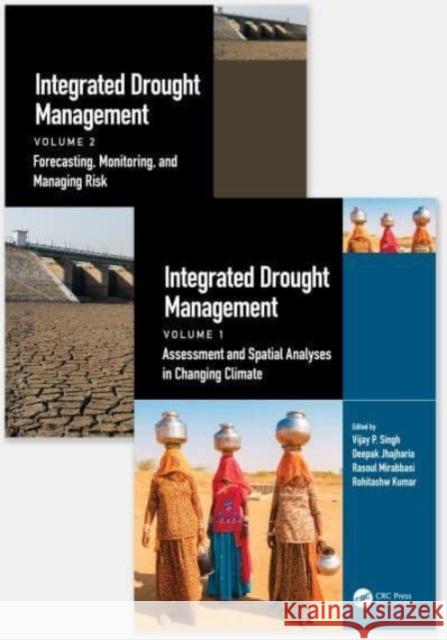Integrated Drought Management, Two Volume Set » książka
Integrated Drought Management, Two Volume Set
ISBN-13: 9781032231587 / Angielski
Integrated Drought Management, Two Volume Set
ISBN-13: 9781032231587 / Angielski
(netto: 1951,11 VAT: 5%)
Najniższa cena z 30 dni: 1511,21
ok. 16-18 dni roboczych.
Darmowa dostawa!
Monitoring drought’s slow evolution and identifying the end of a drought is still a big challenge for scientists, natural resource managers, and decision makers. This comprehensive two-volume set with contributions from over 200 experts, and featuring case studies representing numerous countries throughout the world, discusses different aspects of drought from types, indices, and forecasting to monitoring, modeling, and mitigation measures. It also addresses how climate change is impacting drought and decision-making concluding with lessons learned about science, policy, and managing uncertainty. Features:Provides a global perspective on drought prediction and management and a synthesis of the recent state of knowledge.Covers a wide range of topics from essential concepts and advanced techniques for forecasting and modeling drought to societal impacts, consequences, and planning Presents numerous case studies with different management approaches from different regions and countries.Addresses how climate change impacts drought, the increasing challenges associated with managing drought, decision making, and policy implications.Includes contributions from hundreds of experts around the world.Professionals, researchers, academics, and postgraduate students with knowledge in Environmental Sciences, Ecology, Agriculture, Forestry, Hydrology, Water Resources Engineering, and Earth Sciences, as well as those interested in how climate change impacts drought management, will gain new insights from the experts featured in this two-volume handbook.
Monitoring drought’s slow evolution and identifying the end of a drought is still a big challenge for scientists, natural resource managers, and decision makers. This comprehensive two-volume set with contributions from over 200 experts, and featuring case studies representing numerous countries throughout the world, discusses different aspects of drought from types, indices, and forecasting to monitoring, modeling, and mitigation measures. It also addresses how climate change is impacting drought and decision-making concluding with lessons learned about science, policy, and managing uncertainty.
Features:
- Provides a global perspective on drought prediction and management and a synthesis of the recent state of knowledge.
- Covers a wide range of topics from essential concepts and advanced techniques for forecasting and modeling drought to societal impacts, consequences, and planning
- Presents numerous case studies with different management approaches from different regions and countries.
- Addresses how climate change impacts drought, the increasing challenges associated with managing drought, decision making, and policy implications.
- Includes contributions from hundreds of experts around the world.
Professionals, researchers, academics, and postgraduate students with knowledge in Environmental Sciences, Ecology, Agriculture, Forestry, Hydrology, Water Resources Engineering, and Earth Sciences, as well as those interested in how climate change impacts drought management, will gain new insights from the experts featured in this two-volume handbook.











